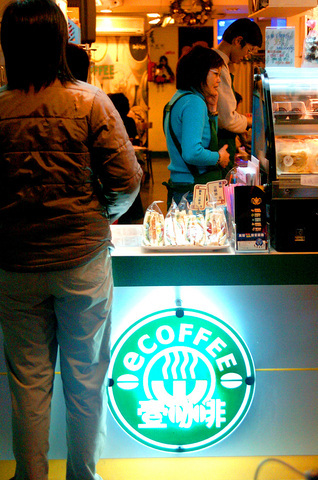President Starbucks Coffee Corp (
"The US headquarters directly commissioned its local attorney to file a complaint over E-Coffee's trademark registration, as the similarity in logos misleads consumers," President Starbucks' public relations officer Bonnie Chao (趙仁安) said yesterday.

PHOTO: SEAN CHAO, TAIPEI TIMES
The case is currently under investigation, Chao said.

PHOTO: SEAN CHAO, TAIPEI TIMES
She said that President Starbucks only found out about its US counterpart's intention to file a complaint on Thursday.
Chao said that she could not comment further, as President Starbucks does not have any involvement in the complaint.
President Starbucks, a 50-50 joint venture, has over 142 outlets across the nation, according to the coffee operator.
The US coffee giant lodged a complaint in October last year to the Intellectual Property Office (IPO) under the Ministry of Economic Affairs over E-Coffee's trademark registration, saying that the similarity would confuse consumers.
E-Coffee has not yet responded to the complaint, the IPO's section chief Chang Hui-ming (
Since the investigation is still at an early stage, the IPO may require more than a year to reach a decision, Chang said.
Starbucks in the US is reportedly also considering complaints against E-Coffee outlets in a number of other countries, including Hong Kong, China, Singapore, and Japan, where E-Coffee's trademark is registered.
E-Coffee, which has more than 280 franchised outlets, denied that its logo is misleading or infringes upon Starbucks' trademark, according to a report in the Chinese-language media citing the company's president Sam Yen (顏文山).
"We are not the only coffee store in Taiwan using a logo featuring dual circles," Yen is reported to have said.
A number of coffee chain stores, including Barista Coffee (西雅圖咖啡) and IS Coffee (伊是咖啡), use circle motifs in their logos.
E-Coffee's logo features a cup of steaming coffee, which is not at all similar to Starbucks' mermaid with curly hair, Yen said.
Yen said that E-Coffee will not settle the dispute unofficially, and does not rule out the possibility of filing a lawsuit if the IPO delivers an unfavorable ruling.

PATENTS: MediaTek Inc said it would not comment on ongoing legal cases, but does not expect the legal action by Huawei to affect its business operations Smartphone integrated chips designer MediaTek Inc (聯發科) on Friday said that a lawsuit filed by Chinese smartphone brand Huawei Technologies Co (華為) over alleged patent infringements would have little impact on its operations. In an announcement posted on the Taiwan Stock Exchange, MediaTek said that it would not comment on an ongoing legal case. However, the company said that Huawei’s legal action would have little impact on its operations. MediaTek’s statement came after China-based PRIP Research said on Thursday that Huawei filed a lawsuit with a Chinese district court claiming that MediaTek infringed on its patents. The infringement mentioned in the lawsuit likely involved

Taipei is today suspending work, classes and its US$2.4 trillion stock market as Typhoon Gaemi approaches Taiwan with strong winds and heavy rain. The nation is not conducting securities, currency or fixed income trading, statements from its stock and currency exchanges said. Authorities had yesterday issued a warning that the storm could affect people on land and canceled some ship crossings and domestic flights. Taiwan Semiconductor Manufacturing Co (TSMC, 台積電) expects its local chipmaking fabs to maintain normal production, the company said in an e-mailed statement. The main chipmaker for Apple Inc and Nvidia Corp said it has activated routine typhoon alert

GROWTH: TSMC increased its projected revenue growth for this year to more than 25 percent, citing stronger-than-expected demand for AI devices and smartphones The Taiwan Institute of Economic Research (TIER, 台灣經濟研究院) yesterday raised its forecast for Taiwan’s GDP growth this year from 3.29 percent to 3.85 percent, as exports and private investment recovered faster than it predicted three months ago. The Taipei-based think tank also expects that Taiwan would see a 8.19 percent increase in exports this year, better than the 7.55 percent it projected in April, as US technology giants spent more money on artificial intelligence (AI) infrastructure and development. “There will be more AI servers going forward, but it remains to be seen if the momentum would extend to personal computers, smartphones and

Catastrophic computer outages caused by a software update from one company have once again exposed the dangers of global technological dependence on a handful of players, experts said on Friday. A flawed update sent out by the little-known security firm CrowdStrike Holdings Inc brought airlines, TV stations and myriad other aspects of daily life to a standstill. The outages affected companies or individuals that use CrowdStrike on the Microsoft Inc’s Windows platform. When they applied the update, the incompatible software crashed computers into a frozen state known as the “blue screen of death.” “Today CrowdStrike has become a household name, but not in